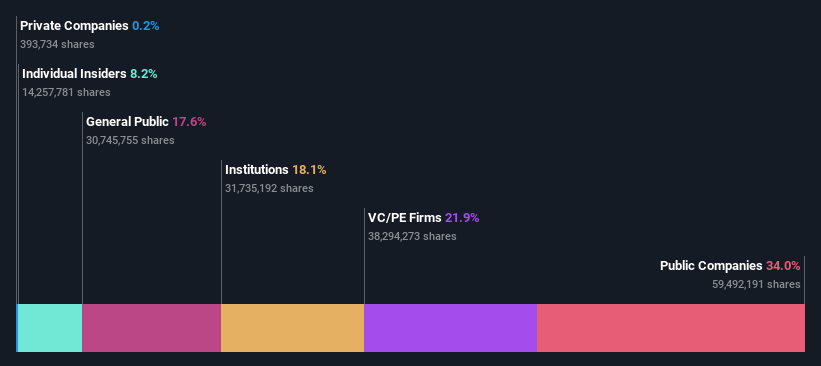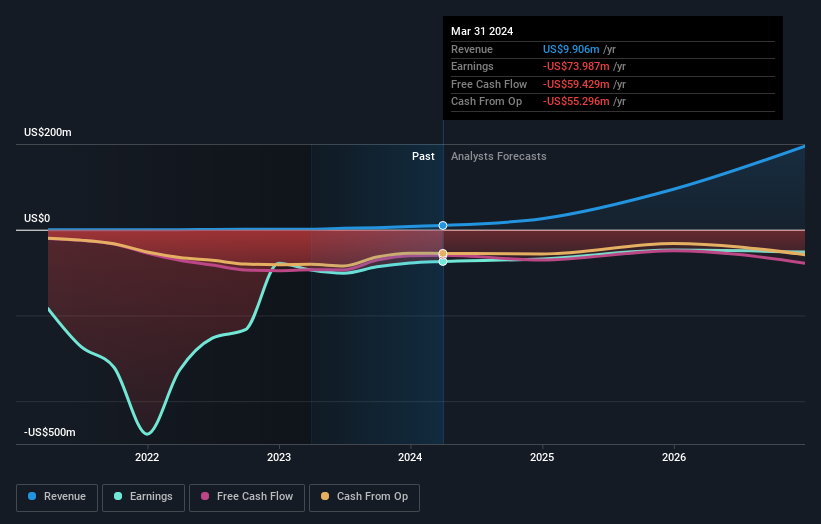ESS Tech, Inc. (NYSE:GWH) stock most popular amongst public companies who own 34%, while private equity firms hold 22%
Key Insights
The considerable ownership by public companies in ESS Tech indicates that they collectively have a greater say in management and business strategy
The top 4 shareholders own 51% of the company
A look at the shareholders of ESS Tech, Inc. (NYSE:GWH) can tell us which group is most powerful. We can see that public companies own the lion's share in the company with 34% ownership. That is, the group stands to benefit the most if the stock rises (or lose the most if there is a downturn).
And private equity firms on the other hand have a 22% ownership in the company.
Let's delve deeper into each type of owner of ESS Tech, beginning with the chart below.
Check out our latest analysis for ESS Tech
What Does The Institutional Ownership Tell Us About ESS Tech?
Institutional investors commonly compare their own returns to the returns of a commonly followed index. So they generally do consider buying larger companies that are included in the relevant benchmark index.
We can see that ESS Tech does have institutional investors; and they hold a good portion of the company's stock. This suggests some credibility amongst professional investors. But we can't rely on that fact alone since institutions make bad investments sometimes, just like everyone does. It is not uncommon to see a big share price drop if two large institutional investors try to sell out of a stock at the same time. So it is worth checking the past earnings trajectory of ESS Tech, (below). Of course, keep in mind that there are other factors to consider, too.
ESS Tech is not owned by hedge funds. Looking at our data, we can see that the largest shareholder is SoftBank Group Corp. with 21% of shares outstanding. Honeywell International Inc. is the second largest shareholder owning 13% of common stock, and Breakthrough Energy LLC holds about 11% of the company stock. Additionally, the company's CEO Eric Dresselhuys directly holds 1.6% of the total shares outstanding.
To make our study more interesting, we found that the top 4 shareholders control more than half of the company which implies that this group has considerable sway over the company's decision-making.
While it makes sense to study institutional ownership data for a company, it also makes sense to study analyst sentiments to know which way the wind is blowing. Quite a few analysts cover the stock, so you could look into forecast growth quite easily.
Insider Ownership Of ESS Tech
The definition of an insider can differ slightly between different countries, but members of the board of directors always count. The company management answer to the board and the latter should represent the interests of shareholders. Notably, sometimes top-level managers are on the board themselves.
I generally consider insider ownership to be a good thing. However, on some occasions it makes it more difficult for other shareholders to hold the board accountable for decisions.
Shareholders would probably be interested to learn that insiders own shares in ESS Tech, Inc.. As individuals, the insiders collectively own US$11m worth of the US$131m company. This shows at least some alignment, but we usually like to see larger insider holdings. You can click here to see if those insiders have been buying or selling.
General Public Ownership
With a 18% ownership, the general public, mostly comprising of individual investors, have some degree of sway over ESS Tech. While this size of ownership may not be enough to sway a policy decision in their favour, they can still make a collective impact on company policies.
Private Equity Ownership
With an ownership of 22%, private equity firms are in a position to play a role in shaping corporate strategy with a focus on value creation. Some investors might be encouraged by this, since private equity are sometimes able to encourage strategies that help the market see the value in the company. Alternatively, those holders might be exiting the investment after taking it public.
Public Company Ownership
We can see that public companies hold 34% of the ESS Tech shares on issue. This may be a strategic interest and the two companies may have related business interests. It could be that they have de-merged. This holding is probably worth investigating further.
Next Steps:
I find it very interesting to look at who exactly owns a company. But to truly gain insight, we need to consider other information, too. To that end, you should be aware of the 3 warning signs we've spotted with ESS Tech .
If you are like me, you may want to think about whether this company will grow or shrink. Luckily, you can check this free report showing analyst forecasts for its future.
NB: Figures in this article are calculated using data from the last twelve months, which refer to the 12-month period ending on the last date of the month the financial statement is dated. This may not be consistent with full year annual report figures.
Have feedback on this article? Concerned about the content? Get in touch with us directly. Alternatively, email editorial-team (at) simplywallst.com.
This article by Simply Wall St is general in nature. We provide commentary based on historical data and analyst forecasts only using an unbiased methodology and our articles are not intended to be financial advice. It does not constitute a recommendation to buy or sell any stock, and does not take account of your objectives, or your financial situation. We aim to bring you long-term focused analysis driven by fundamental data. Note that our analysis may not factor in the latest price-sensitive company announcements or qualitative material. Simply Wall St has no position in any stocks mentioned.
Have feedback on this article? Concerned about the content? Get in touch with us directly. Alternatively, email editorial-team@simplywallst.com

 Yahoo Finance
Yahoo Finance 

